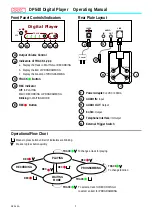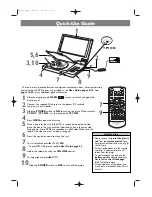
1-4
SERVICING PRECAUTIONS
CAUTION : Before servicing the DVD covered by this service
data and its supplements and addends, read and follow the
SAFETY
PRECAUTIONS. NOTE
: if unforeseen
circumstances create conflict between the following
servicing precautions and any of the safety precautions in
this publications, always follow the safety precautions.
Remembers Safety First:
General Servicing Precautions
1. Always unplug the DVD AC power cord from the AC power
source before:
(1) Removing or reinstalling any component, circuit board,
module, or any other assembly.
(2) Disconnection or reconnecting any internal electrical
plug or other electrical connection.
(3) Connecting a test substitute in parallel with an
electrolytic capacitor.
Caution
: A wrong part substitution or incorrect polarity
installation of electrolytic capacitors may
result in an explosion hazard.
2. Do not spray chemicals on or near this DVD or any of its
assemblies.
3. Unless specified otherwise in this service data, clean
electrical contacts by applying an appropriate contact
cleaning solution to the contacts with a pipe cleaner,
cotton-tipped swab, or comparable soft applicator. Unless
specified otherwise in this service data, lubrication of
contacts is not required.
4. Do not defeat any plug/socket B+ voltage interlocks with
whitch instruments covered by this service manual might
be equipped.
5. Do not apply AC power to this DVD and/or any of its
electrical assemblies unless all solid-state device heat
sinks are cerrectly installed.
6. Always connect test instrument ground lead to the
appropriate ground before connection the test instrument
positive lead. Always remove the test instrument ground
lead last.
Insulation Checking Procedure
Disconnect the attachment plug from the AC outlet and turn
the power on. Connect an insulation resistance meter(500V)
to the blades of the attachment plug. The insulation
resistance between each blade of the attachment plug and
accessible conductive parts (Note 1) should be more than
1Mohm.
Note 1
: Accessible Conductive Parts including Metal panels,
Input terminals, Earphone jacks, etc.
Electrostatically Sensitive (ES) Devices
Some semiconductor (solid state) devices can be damaged
easily by static electricity. Such components commonly are
called Electrostatically Sensitive (ES) Devices. Examples of
typical ES devices are integrated circuits and some field
effect transistors and semiconductor chip components. The
following techniques should be used to help reduce the
incidence of component damage caused by static electricity.
1. Immediately before handling any semiconductor
component or semiconductor-equipped assembly, drain off
any electrostatic charge on your body by touching a known
earth ground.
Alternatively, obtain and wear a commercially available
discharging wrist strap device, which should be removed
for potential shock reasons prior to applying power to the
unit under test.
2. After removing an electrical assembly equipped with ES
devices, place the assembly on a conductive surface such
as aluminum foil, to prevent electrostatic charge buildup or
exposure of the assembly.
3. Use only a grouned-tip soldering iron to solder or unsolder
ES devices.
4. Use only an anti-static solder removal device. Some solder
removal devices not classified a “anti-static” can generate
electrical charges sufficient to damage ES devices.
5. Do not use freon-propelled chemicals. These can generate
electrical charge sufficient to damage ES devices.
6. Do not remove a replacement ES device from its
protective package until immediately before you are ready
to install it. (Most replacement ES devices are packaged
with leads electrically shorted together by conductive
foam, aluminum foil, or comparable conductive material).
7. Immediately before removing the protective material from
the leads of a replacement ES device, touch the protective
material to the chassis or circuit assembly into which the
device will be installed.
Caution
: Be sure no power is applied to the chassis or
circuit, and observe all other safety precautions.
8. Minimize bodily motions when handling unpackaged
replacement ES devices. (Normally harmless motion such
as the brushing together of your clothes fabric or the lifting
of your foot from a carpeted floor can generate static
electricity sufficient to damage an ES device.)
Summary of Contents for DV286
Page 11: ...2 4 3 PACKING ACCESSORY SECTION ...
Page 26: ...3 15 FIG 7 2 DVD F FE RFL FIG 7 3 CD F FE RFL ...
Page 31: ...3 20 2 COMPOSITE VIDEO SIGNAL FIG 12 2 13 AUDIO OUTPUT FROM MT1389E FIG 13 1 ...
Page 32: ...3 21 CONNECTOR PICTURE 1 FULL CONNECTOR PICTURE ...
Page 33: ...3 22 CN201 22PIN 2 CN201 CONNECTOR PICTURE CN202 9PIN 3 CN202 CONNECTOR PICTURE ...
Page 34: ...3 23 CN601 12PIN 4 CN601 CONNECTOR PICTURE CN602 10PIN 5 CN602 CONNECTOR PICTURE ...
Page 35: ...3 24 CN703 12PIN 7 CN703 CONNECTOR PICTURE CN605 5PIN 6 CN605 CONNECTOR PICTURE ...
Page 36: ...3 25 CN704 9PIN P101 10PIN 8 CN704 CONNECTOR PICTURE 9 P101 CONNECTOR PICTURE ...
Page 37: ...3 26 BLOCK DIAGRAMS 1 OVERALL BLOCK DIAGRAM ...
Page 38: ...3 27 2 POWER SUPPLY BLOCK DIAGRAM ...
Page 39: ...3 28 3 SERVO BLOCK DIAGRAM ...
Page 40: ...3 29 4 MPEG MEMORY BLOCK DIAGRAM ...
Page 41: ...3 30 5 VIDEO BLOCK DIAGRAM ...
Page 42: ...3 31 6 AUDIO BLOCK DIAGRAM ...
Page 43: ...3 32 MEMO ...
Page 45: ...3 35 3 36 2 SYSTEM MPEG CIRCUIT DIAGRAM ...
Page 46: ...3 37 3 38 3 SERVO CIRCUIT DIAGRAM ...
Page 47: ...3 39 3 40 4 AV JACK CIRCUIT DIAGRAM ...
Page 48: ...3 41 3 42 5 KARAOKE USB CIRCUIT DIAGRAM 8 9 TOOL ...
Page 49: ...3 43 3 44 6 TIMER KEY CIRCUIT DIAGRAM 4 7 TOOL ...
Page 50: ...3 45 3 46 7 TIMER KEY CIRCUIT DIAGRAM 5 TOOL ...
Page 51: ...3 47 3 48 8 TIMER KEY CIRCUIT DIAGRAM 8 TOOL ...
Page 52: ...3 49 3 50 9 TIMER KEY CIRCUIT DIAGRAM 9 TOOL ...
Page 54: ...3 53 3 54 PRINTED CIRCUIT DIAGRAMS 1 MAIN P C BOARD TOP VIEW BOTTOM VIEW ...
Page 56: ...3 57 3 58 5 SMPS P C BOARD 6 SUB SCART OPTIONAL PART 430mm 7 SUB 5 1CH OPTIONAL PART 430mm ...
Page 57: ...3 59 3 60 MEMO MEMO ...
Page 63: ...4 6 MEMO ...
Page 65: ...4 9 4 10 MEMO MEMO ...






































